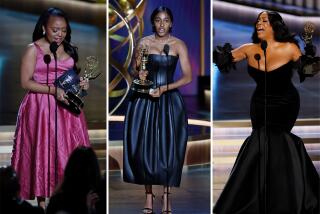After a year defined by Black stories, Golden Globe nominations fall short
- Share via
HBO’s “Lovecraft Country,” and “I May Destroy You,” Showtime’s “The Good Lord Bird” and Netflix’s “Bridgerton” were among several TV series celebrated for their distinctive treatment of race and racism — and their intersection with sex, gender and genre — in 2020, as the Black Lives Matter movement swept the country in the aftermath of the police killing of George Floyd.
Yet those shows, along with other high-profile series featuring Black stars including veteran hits “black-ish” (ABC) and “Insecure” (HBO) were largely passed over for nominations for the 78th Golden Globe Awards, announced Wednesday by Sarah Jessica Parker and Taraji P. Henson. The snubs come one year after the Hollywood Foreign Press Assn. was roundly criticized for failing to recognize topical Black-themed projects and other shows with non-white perspectives.
A similar lack of recognition could be seen in the best picture nominations: None of the four Black-led ensemble films at the forefront of this awards season — “Ma Rainey’s Black Bottom,” “Judas and the Black Messiah,” “One Night in Miami” and “Da 5 Bloods” — landed a shot at the top prize, and Spike Lee’s “Bloods,” starring Delroy Lindo, was shut out entirely. “Malcolm & Marie,” with Zendaya and John David Washington, was also overlooked.
The films fared slightly better in the individual categories: Actors Daniel Kaluuya (“Judas”), Leslie Odom Jr. (“One Night in Miami”) and Viola Davis and the late Chadwick Boseman (“Ma Rainey”) earned acting recognition, while “One Night in Miami” also scored nominations for director Regina King and original song.
In the TV arena, “Lovecraft Country,” which had a predominantly Black cast including Jurnee Smollett and Michael K. Williams and mixed its edgy explorations of racism and police brutality with the fantastical elements of science-fiction, magic and horror, earned a drama series nomination from the Globes but none for acting.
Even more glaring was the total omission of HBO’s limited series “I May Destroy You.” The half-hour dramedy about a woman’s trauma after being sexually assaulted was one of the summer’s buzziest shows, while serving as a flashy vehicle for star Michaela Coel, who created the series in addition to writing and co-directing. The show also featured a vivid look at the U.K’s African and Caribbean subcultures. Uzo Aduba, who won a supporting actress Emmy for playing Shirley Chisholm in “Mrs. America,” also missed out on a nomination in the limited series categories.
And despite Netflix’s dominance overall, “Bridgerton,” the streamer’s period romance from powerhouse executive producer Shonda Rhimes, which was hailed for its multicultural casting, was a no-show in the nominations. “The Good Lord Bird,” about abolitionist John Brown and his all-consuming crusade to end slavery in pre-Civil War America, received positive critical notices but had only one major nomination, for lead actor Ethan Hawke.
Amazon’s “Small Axe,” which was originally conceived as a collection of films, was one of the few Black-themed projects to break through, landing nominations for limited series and supporting actor John Boyega. The only other Black performer in a TV acting category was Don Cheadle for Showtime’s “Black Monday.”
On the TV side, at least, the snubs are reminiscent of the HFPA’s dismissal last year of HBO’s “Watchmen” and Netflix’s “When They See Us,” about the so-called Central Park Five. “Watchmen,” which tackled racism, police brutality and the rise of white supremacy, ended up being the biggest winner at the Emmys, landing 11 awards including limited series and lead actress for Regina King.
More to Read
The complete guide to home viewing
Get Screen Gab for everything about the TV shows and streaming movies everyone’s talking about.
You may occasionally receive promotional content from the Los Angeles Times.








